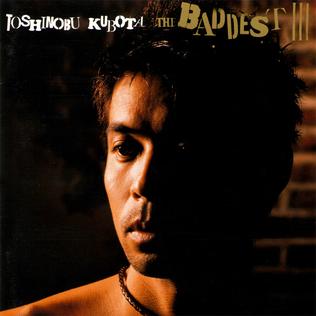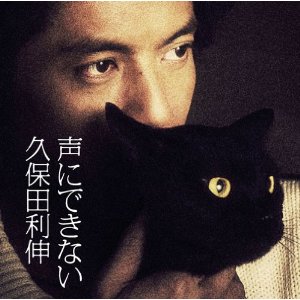Toshinobu "Toshi" Kubota is a Japanese singer, songwriter, musician, music producer, and radio personality. He has produced six million-seller records and thirty-three Top 40 singles during his career. Kubota is currently part of Sony Music Japan. In addition, he has composed and written songs for many singers including Hiromi Iwasaki, Misia, Toshinori Yonekura, Kyōko Koizumi, and many other recording artists.

La La La Love Thang is the ninth studio album of Japanese singer Toshinobu Kubota, released on December 2, 1996. The album has been certified triple platinum by the Recording Industry Association of Japan. It was also successful in international music markets and yielded two singles: "Niji No Grand Slam" and "La La La Love Song". Kubota then embarked on his first international concert tour in 1996, which he titled the Oyeees! Tour. A live album, Toshinobu Kubota Concert Tour '96: Oyeees!, was released which featured footage from the tour. As of February 2012, La La La Love Thang has sold over 840,000 copies worldwide.
The discography of Japanese R&B singer Toshinobu Kubota consists of nineteen studio albums, ten compilation albums, two tribute albums, and over seventy singles. In 1985, Kubota signed with Sony Japan and began producing and writing songs for many of label's singers and groups. Under the label, Kubota released his first single, "Shitsui no Downtown" in June 1986, followed by "Time Shower ni Utarete" in December. Both songs were well received by radio, placing fifty-three and thirty-five on the Oricon Singles Chart. In September 1986, his debut album, Shake It Paradise, peaked at number twenty-two and remained on the Oricon Albums Chart for seven consecutive weeks. Shake It Paradise became certified million. The following year in 1987, Kubota's second studio album, Groovin', debuted at number thirty-three and was certified million. In February 1988, Kubota released "You Were Mine", which debuted at number two. In September 1988, Kubota released his third album, Such A Funky Thang!. The album peaked at number one and was certified million. The album also spawned the top-charted single "Dance If You Want It", which peaked at number three. In 1989, Kubota released his compilation album, The Baddest. The album also peaked at number one and was certified million.

"La La La Love Song" is a song recorded by Japanese R&B singer Toshinobu Kubota for his ninth studio album, La La La Love Thang (1996). The song was written by Kubota and produced by Yoichiro Kakizaki.

Kubojah: Parallel World I is the fifth studio album of Japanese singer Toshinobu Kubota, released on September 21, 1991.

Neptune is the sixth studio album by Japanese singer Toshinobu Kubota, released on July 1, 1992. The album charted at number 3 on the Oricon Monthly Albums chart and remained on the charts for total of 13 weeks. The album sold a total of 484,000 units, reaching double platinum certification.

Gold Skool is the sixteenth studio album of Japanese singer Toshinobu Kubota, released on August 3, 2011. The album charted at number 3 on the Oricon Albums chart and remained on the charts for total of 18 weeks. The album sold over 78,124 units in Japan.

Timeless Fly is the fifteenth studio album of Japanese singer Toshinobu Kubota, released on February 24, 2010. The album charted at number 9 on the Oricon Albums chart and remained on the charts for total of 26 weeks. The album sold over 16,063 units in Japan.

For Real? is the 14th studio album of Japanese singer Toshinobu Kubota, released on March 1, 2006. The album charted at number 13 on the Oricon Albums chart and remained on the charts for total of 9 weeks. The album sold over 33,000 units in Japan.

United Flow is the twelfth studio album by Japanese singer Toshinobu Kubota, released on April 10, 2002. The album sold over 68,000 units in Japan.

Soul Tree: A Musical Tribute to Toshinobu Kubota is a tribute album by various artists, released on February 25, 2004. The album was a tribute to Japanese singer-songwriter and musician Toshinobu Kubota. The album features performances by BoA, Soul'd Out, The Gospellers, Naniwa Express, Mika Nakashima, Soulhead, Atsushi, Sowele, Skoop On Somebody, Misia, Junpei Shiina with dance man, Rhymester, and Super Butter Dog Marcket. The album charted at number 9 on the Oricon Albums chart.

Toshinobu Kubota Greatest Hits is the third series of greatest hits compilations by Japanese singer Toshinobu Kubota. The album was only released in 1998 in Hong Kong on the Sony Music Entertainment Hong Kong recording label.

The Baddest: Only For Lovers In The Mood is a compilation by Japanese singer Toshinobu Kubota. The album was released on July 24, 2002 on Sony Music Entertainment. Unlike its predecessors, the album only features love songs, excluding the Kubota's hit singles from the album. The album charted at number 22 on the Oricon Weekly Albums chart and remained on the charts for two weeks.

The Baddest III is a compilation released by Japanese singer Toshinobu Kubota, on December 4, 2002. The album charted at number 3 on the Oricon Weekly Albums chart and stay on the charts for a total of eighteen weeks. The album also sold over 316,000 units in Japan.

The Baddest: Hit Parade is a compilation released by Japanese singer Toshinobu Kubota. This album was released in Japan at the end of November 2011 to commemorate the twenty-fifth anniversary of Kubota's music. The album charted at number 2 on the Oricon Weekly Albums chart and remained on the charts for a total of 38 weeks. The album became certified platinum, selling over 351,049+ units in Japan.

"Koe ni Dekinai" is a song recorded by Japanese R&B singer Toshinobu Kubota for his sixteenth studio album, Gold Skool (2011). The song was released on September 28, 2011, as the second single from the album.

"Nagareboshi to Koi no Ame" is a song recorded by Japanese R&B singer Toshinobu Kubota for his sixteenth studio album, Gold Skool (2011).

"Love Rain (Koi no Ame)" is a song recorded by Japanese R&B singer Toshinobu Kubota for his compilation album, Love & Rain: Love Songs (2010). The song was released on June 6, 2010, as the lead single from the album.

Timeless Fly Tour was the concert tour by Japanese singer-songwriter Toshinobu Kubota in support of his fifteenth album Timeless Fly.
Love Rain is a South Korean television series also known as Sarang bi.
















